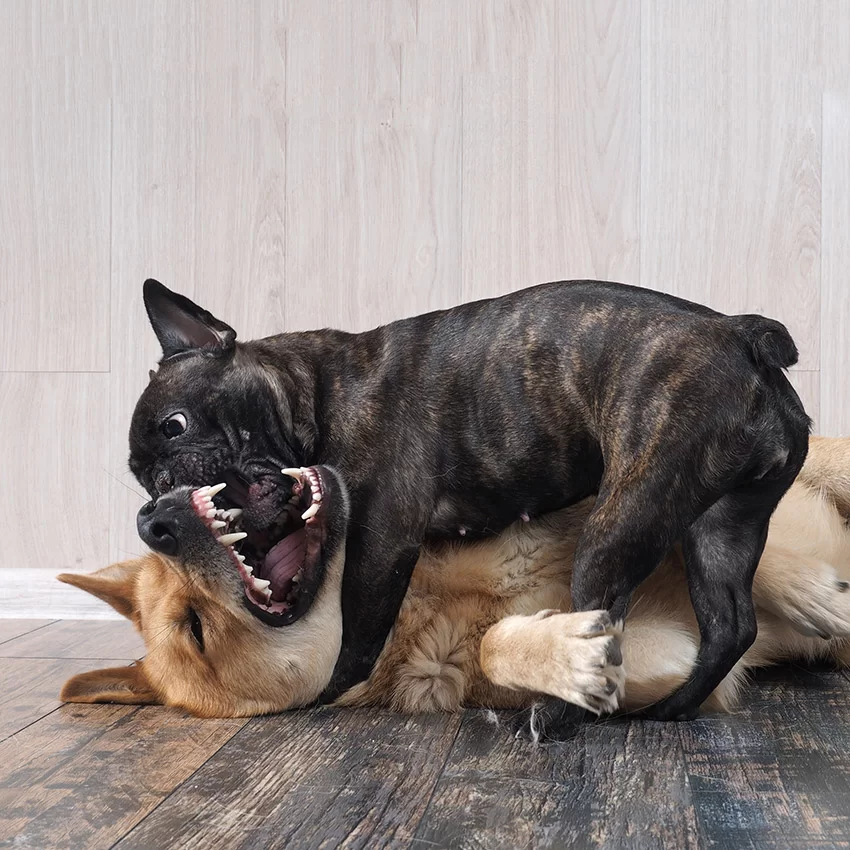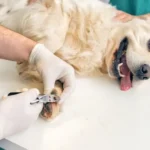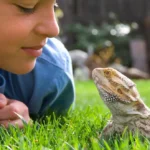French Bulldogs make pleasant pets however also generally tend to show off certain French Bulldog behavior issues that owners need to address thru schooling. This comprehensive guide covers the most commonplace French Bulldog behavior troubles why they arise and tested solutions subsidized through effective reinforcement.
With consistency and dedication to education, French Bulldog proprietors can regulate undesirable habits and domesticate a well-behaved accomplice. by understanding and addressing these French Bulldog conduct problems, you may be properly ready to enjoy a harmonious relationship together with your adorable Frenchie.
Destructive Chewing: A Common French Bulldog Behavior Issues
Being small dogs with high energy French bulldogs often redirect pent up excitement into chewing when bored or anxious. Teething pain as dogs also encourages chewing for relief. Without appropriate outlets it can develop into serious destructive behavior as dogs mature.
The tendency to chew strongly reinforces why preventative crate training and providing ample enrichment is crucial from a young age. A properly introduced crate establishes boundaries while satisfying a dog’s need for a safe den space. It also allows supervision when owners cannot directly monitor playtime.
For crate training to succeed select a size large enough for comfort but not so big it enables accidents. Place a soft blanket and chew toys inside. Feed meals in the crate to form positive associations. During initial training give treats and praise for calm behavior while inside. This shows chewing toys leads to rewards rather than punishment.
When crated provide interactive toys that occupy jaws and minds. for example toys that dispense treats as they are manipulated mentally stimulate dogs in addition to providing chew stimulation.
| Popular Interactive Chew Toys |
| Kong |
| Tug toys with treats inside handles or knots |
| Flirt poles with attached toys |
| treat stuffed rubber toys |
| Puzzle toys that release food through moves/licks |
Always supervise during play to interrupt attempts to chew inappropriate objects redirecting to acceptable chews. Praise and reward with treats and affection strengthens redirection. Gradually dogs learn proper chew habits.
Being diligent means preventing access to shoes furniture or personal items that may be destroyed otherwise. Temporary baby gates allow roaming specific chew proof areas. Consistency and vigilance are most important during the formative first year. With patience and daily practice destructive chewing tendencies subside.
Aggression Towards Other Dogs
Because of their smaller stature and occasional breed traits certain French bulldogs act defensively around unfamiliar dogs if not properly socialized from a young age. However with positive training exposure to well-behaved canine friends during critical socialization windows these tendencies naturally decrease.
Early socialization establishes confidence meeting new dogs as non threatening encounters. While puppies undergo immunizations controlled meetings with vaccinated calm dogs provides valuable experiences.
Always supervise closely and end interactions on a positive note to avoid adverse associations forming. Owners who skip this step risk puppies growing into adults hesitant or even reactive towards other pooches.
For adult dogs already exhibiting signs of dog aggression like lunging barking or growling it is important to not overwhelm but instead conduct desensitization and counterconditioning exercises slowly and carefully.
Maintain a 10 to15 foot distance from triggers and reward calm behaviors even in the presence of other dogs. Gradually decrease separation over multiple short sessions as triggers provoke less stress. Always keep dogs under threshold to avoid setbacks.
With repetition and treats for calm behaviors a new pattern emerges in which positive reinforcement imprints relaxation as the automatic response to previous visual triggers.
While training takes commitment diligent application of proven methods alleviate anxiety and resulting dog aggression in nearly all cases with dedicated practice over time. A French bulldog approaches other dogs neutrally becomes achievable even for adults through appropriate rehabilitation.
Separation Anxiety
French bulldogs frequently display separation distress given their inherent affection for human bonds. Without guidance anxiety escalates into destructive or unhealthy actions intended to relieve emotional discomfort. Tales abound of Frenchie’s who injured themselves or damaged homes in desperation for reassurance their owners would return.
Early training forms independence and teaches relaxation during short controlled periods alone. Establishing a routine with gentle departures avoids emotionally charged goodbyes that trigger more anxiety.
Leaving radio or television playing creates comforting ambient noise during absences along with providing engaging puzzle toys or treat dispensing Kong’s to occupy anxious minds.
When first introducing brief time alone ensure safety from harm then ignore distressed vocalizations upon immediate return to avoid unintentionally rewarding anxiety behaviors.
Lengthen periods gradually over multiple daily sessions allowing relaxation to imprint as default response rather than panic. Never use punishment that risks worsening reactions rooted in fears.
Mental and physical exercise prior to separation eases restlessness while lone and gradual acclimation develops confidence being solo need not result in abandonment.
Just as crate training accustoms to den separation simulated departures prepare French bulldogs for owners’ inevitable temporary exits without distress. For rescue cases displaying severe symptoms temporarily crating with a calming pheromone diffuser combines biological and behavioral therapies effectively as a last intervention.
Dedicated non reactive owners see anxious tendencies fade over many consistent months. Separation trained pets learn solitude brings fulfillment not danger. By meeting psychological needs through relationship building activities French bulldogs develop secure attachments and resilience to separation.
Additional Behavior Challenges
Beyond these staple issues French bulldogs exhibit various quirks needing guidance:
Housetraining
Strict regimen establishes putty rules. Frequent outdoor trips after meals upon waking and play reward bladder and bowel control. Clean all indoor accidents thoroughly to avoid reinforcing areas. Be patient as smaller bladders mean puppies need attention every 1 to2 hours.
Begging or Stealing Food
Do not give in to beggars and establish leave it through positive reinforcement. Teach placing paws on owner or counter warrants ignoring until calming down. Food remains a reward for obedience not taken without permission.
Cooperative Grooming
Condition calm demeanor through play focusing grooming tools like clippers. Reward relaxation during baths nail trims and vet visits with treats. Consistency teaches restraint for activities benefiting health.
Possessiveness
Do not punish resource guarding but redirect onto toys instead of shoes or toys. Teach loose leash skills and dropping items calmly on command through positive reinforcement of alternate behaviors. Build trust Frenchie’s feel secure with owners.
FAQs
Q:Do French Bulldogs have behavioral issues?
A:Frenchies not adequately exposed to different people, animals, and environments during puppyhood may develop fearful or aggressive behaviors later.
Q:What is the biggest problem with French Bulldogs?
A:Brachycephalic Obstructive Airway Syndrome (BOAS)
Q:How to discipline a French Bulldog?
A:Start with basic commands like “sit,” “stay,” “come,” and “no.”
Conclusion
With knowledge and dedication to humane training principles French bulldog owners cultivate well adjusted pets from any behavior issue. Whether chewing aggression anxiety or other quirks consistency and creativity applying proven solutions sees challenges dissolve. Understanding French bulldog psychology and meeting both mental and physical needs facilitates balanced companions enriched for loving homes. Perseverance through challenge builds lifelong bonds and well deserved reputations for the affectionate breed.

Hi. My Name is Alexander Bell. I am a professional content writer since 2006.
18+ years of experience crafting compelling and authoritative content for diverse audiences.
🖋️ Specialize in formal article writing, combining meticulous research with engaging storytelling.
📚 Proven track record of delivering high-quality content across various industries, including technology, finance, and healthcare.
💡 Skilled in SEO best practices and optimizing content for digital platforms to maximize reach and engagement.
🔍 Strong research capabilities, adept at distilling complex information into accessible, informative articles.
🎓 BA in English Literature










